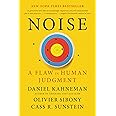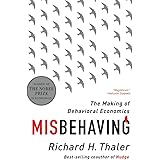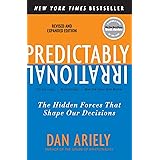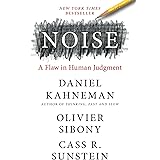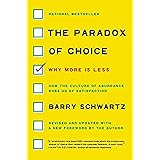
Enjoy fast, free delivery, exclusive deals, and award-winning movies & TV shows with Prime
Try Prime and start saving today with fast, free delivery
Amazon Prime includes:
Fast, FREE Delivery is available to Prime members. To join, select "Try Amazon Prime and start saving today with Fast, FREE Delivery" below the Add to Cart button.
Amazon Prime members enjoy:- Cardmembers earn 5% Back at Amazon.com with a Prime Credit Card.
- Unlimited Free Two-Day Delivery
- Streaming of thousands of movies and TV shows with limited ads on Prime Video.
- A Kindle book to borrow for free each month - with no due dates
- Listen to over 2 million songs and hundreds of playlists
- Unlimited photo storage with anywhere access
Important: Your credit card will NOT be charged when you start your free trial or if you cancel during the trial period. If you're happy with Amazon Prime, do nothing. At the end of the free trial, your membership will automatically upgrade to a monthly membership.
Buy new:
$8.93$8.93
Buy used:
$4.68





Download the free Kindle app and start reading Kindle books instantly on your smartphone, tablet, or computer - no Kindle device required.
Read instantly on your browser with Kindle for Web.
Using your mobile phone camera - scan the code below and download the Kindle app.

 Audible sample Sample
Audible sample Sample



Follow the authors
OK
Nudge: The Final Edition Paperback – August 3, 2021
Purchase options and add-ons
An essential new edition―revised and updated from cover to cover―of one of the most important books of the last two decades, by Nobel Prize winner Richard H. Thaler and Cass R. Sunstein
More than 2 million copies sold
Since the original publication of Nudge more than a decade ago, the title has entered the vocabulary of businesspeople, policy makers, engaged citizens, and consumers everywhere. The book has given rise to more than 400 “nudge units” in governments around the world and countless groups of behavioral scientists in every part of the economy. It has taught us how to use thoughtful “choice architecture”—a concept the authors invented—to help us make better decisions for ourselves, our families, and our society.
Now, the authors have rewritten the book from cover to cover, making use of their experiences in and out of government over the past dozen years as well as an explosion of new research in numerous academic disciplines. To commit themselves to never undertaking this daunting task again, they are calling this the “final edition.” It offers a wealth of new insights, for both its avowed fans and newcomers to the field, about a wide variety of issues that we face in our daily lives—COVID-19, health, personal finance, retirement savings, credit card debt, home mortgages, medical care, organ donation, climate change, and “sludge” (paperwork and other nuisances we don’t want, and that keep us from getting what we do want)—all while honoring one of the cardinal rules of nudging: make it fun!
-
Print length384 pages
-
LanguageEnglish
-
PublisherPenguin Books
-
Publication dateAugust 3, 2021
-
Dimensions5.47 x 0.79 x 8.44 inches
-
ISBN-10014313700X
-
ISBN-13978-0143137009
The Amazon Book Review
Book recommendations, author interviews, editors' picks, and more. Read it now.
Frequently bought together
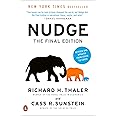
Similar items that may ship from close to you
-
 A choice architect has the responsibility for organizing the context in which people make decisions.Highlighted by 2,895 Kindle readers
A choice architect has the responsibility for organizing the context in which people make decisions.Highlighted by 2,895 Kindle readers -
 First, never underestimate the power of inertia. Second, that power can be harnessed.Highlighted by 2,357 Kindle readers
First, never underestimate the power of inertia. Second, that power can be harnessed.Highlighted by 2,357 Kindle readers -
 Loss aversion helps produce inertia, meaning a strong desire to stick with your current holdings.Highlighted by 2,193 Kindle readers
Loss aversion helps produce inertia, meaning a strong desire to stick with your current holdings.Highlighted by 2,193 Kindle readers
From the Publisher


|
|
|
|
|---|---|---|
|
|
|
|
Editorial Reviews
Review
“A cultural phenomenon [that] finally brought behavioral economics into the mainstream . . . This version of the book is chock-full of new ideas. . . . Since the pandemic began, governments and companies around the world have had to think creatively about how to nudge people to wear masks, socially distance, and get vaccinated. And we’ve seen a lot of creative campaigns that adopt strategies outlined in Nudge.” ―NPR’s Planet Money
“Few books can be said to have changed the world, but Nudge did. The Final Edition is marvelous: funny, useful, and wise.” ―Daniel Kahneman, #1 New York Times bestselling author of Thinking, Fast and Slow
“Nudge should be required reading for anyone who aspires to run a country, lead a company, raise a child, or make a choice. It’s the gold standard for using behavioral science to guide decisions and policies, and the new edition is even better than the original.” ―Adam Grant, #1 New York Times bestselling author of Think Again and host of the TED podcast WorkLife
“Nudge has changed the way we think about both business’s and society’s biggest problems. The Final Edition is full of new insights and well worth reading.” ―Eric Schmidt, former CEO of Google
“We used the core principles of Nudge when designing our protocols for resuming play during the pandemic. This new edition provides a refreshed set of practical concepts and strategies to influence decision-making for good.” ―Adam Silver, NBA commissioner
“If you’ve read Nudge and think you fully grasp the concept and its uses, you are mistaken. The new edition significantly deepened my understanding of what nudges are and how they can be employed. It truly is a must-read.” ―Robert Cialdini, New York Times bestselling author of Influence
“Revolutionary. Once you’ve read it, you start seeing the evidence everywhere. Evidence that economic orthodoxy is woefully out of date, that as humans we’re not always rational, and that in every bit of architecture, design, and economic choice, we are ALWAYS being nudged in some way. Once we see and accept that, we can ask how we can make better choices. This book points us in the direction. It changes the way you see the world—this edition even more so.” ―David Byrne, musician
“In the spirit of Donald Norman’s The Design of Everyday Things . . . Thaler and Sunstein deliver a spirited argument to enable well-informed people to overcome various biases and ‘probabilistic harms’ to do what is best for them and, in the present case, their fellow ‘American Humans.’ . . . Students of design, politics, economics, and many other fields will delight in these provocative discussions.” ―Kirkus Reviews
Acclaim for the original edition of Nudge
“Nudge has changed the world. You may not realise it, but as a result of its findings you’re likely to live longer, retire richer and maybe even save other people’s lives.” —The Times (London)
“Probably the most influential popular science book ever written.” —BBC Radio 4
“One of the few books . . . that fundamentally changed the way I think about the world.” —Steven D. Levitt, coauthor of Freakonomics
“Engaging and insightful . . . The conceptual argument is powerful, and most of the authors’ suggestions are common sense at its best. . . . For that we should all applaud loudly.” —The New York Times Book Review
“An essential read . . . The book isn’t only humorous, it’s loaded with good ideas that financial-service executives, policy makers, Wall Street mavens, and all savers can use.” —The Boston Globe
“This book is terrific. It will change the way you think, not only about the world around you and some of its bigger problems, but also about yourself.” —Michael Lewis, author of Moneyball and Liar’s Poker
“This gem of a book . . . is a must-read for anyone who wants to see both our minds and our society working better. It will improve your decisions and it will make the world a better place.” —Daniel Kahneman, Nobel Prize–winning author of Thinking, Fast and Slow
“Utterly brilliant . . . Nudge won’t nudge you—it will knock you off your feet.” —Daniel Gilbert, author of Stumbling on Happiness
“Nudge is as important a book as any I’ve read in perhaps twenty years. It is a book that people interested in any aspect of public policy should read. It is a book that people interested in politics should read. It is a book that people interested in ideas about human freedom should read. It is a book that people interested in promoting human welfare should read. If you’re not interested in any of these topics, you can read something else.” —Barry Schwartz, The American Prospect
“Engaging, informative, and thoroughly delightful.” —Don Norman, author of The Design of Everyday Things and The Design of Future Things
“A wonderful book: more fun than any important book has a right to be—and yet it is truly both.” —Roger Lowenstein, author of When Genius Failed
“Save the planet, save yourself. Do-gooders, policymakers, this one’s for you.” —Newsweek
“Great fun to read . . . Sunstein and Thaler are very persuasive.” —Slate
“Nudge helps us understand our weaknesses, and suggests savvy ways to counter them.” —The New York Observer
“Always stimulating . . . An entertaining book that also deeply informs.” —Barron’s
“Entertaining, engaging, and well written . . . Highly recommended.” —Choice
“This Poor Richard’s Almanack for the 21st century . . . shares both the sagacity and the witty and accessible style of its 18th-century predecessor.” —Law and Politics Book Review
“There are superb insights in Nudge.” —Financial Times
About the Author
Cass R. Sunstein is the Robert Walmsley University Professor at Harvard Law School, where he is the founder and director of the Program on Behavioral Economics and Public Policy. From 2009 to 2012 he served in the Obama administration as administrator of the White House Office of Information and Regulatory Affairs, from 2020 to 2021 he served as chair of the Technical Advisory Group for Behavioral Insights and Health at the World Health Organization, and in 2021 he joined the Biden administration as senior counselor and regulatory policy officer in the Department of Homeland Security. His many books include Impeachment: A Citizen's Guide, Too Much Information, and, with Daniel Kahneman and Olivier Sibony, Noise. He is the recipient of the 2018 Holberg Prize, awarded annually to a scholar who has made outstanding contributions to research in the arts, humanities, social sciences, law, or theology.
Excerpt. © Reprinted by permission. All rights reserved.
- The design of menus gets you to eat (and spend) more. For example, lining up all prices on either side of the menu leads many consumers to simply pick the cheapest item. On the other hand, discretely listing prices at the end of food descriptions lets people read about the appetizing options first…; and then see prices.
- "Flies" in urinals improve, well, aim. When Amsterdam's Schiphol Airport was faced with the not uncommon issue of dirty urinals, they chose a unique solution: by painting "flies" in the (center of) commodes, men obligingly aimed at the insects, reducing spillage by 80 percent.
- Credit card minimum payments affect repayment schedules. Among those who only partially pay off credit card balances each month, the repayment level is correlated with the card's minimum payment — in other words, the lower the minimum payment, the longer it takes a consumer to pay off the card balance.
- Automatic savings programs increase savings rate. All over the country, companies are adopting the Save More Tomorrow program: firms offer employees who are not saving very much the option of joining a program in which their saving rates are automatically increased whenever they get a raise. This plan has more than tripled saving rates in some firms, and is now offered by thousands of employers.
- "Defaults" can improve rates of organ donation. In the United States, about one–third of citizens have signed organ donor cards. Compare this to Austria, where 99 percent of people are potential organ donors. One obvious difference? Americans must explicitly consent to become organ donors (by signing forms, for example) while Austrians must opt out if they do not want to be organ donors.
Product details
- Publisher : Penguin Books; Revised edition (August 3, 2021)
- Language : English
- Paperback : 384 pages
- ISBN-10 : 014313700X
- ISBN-13 : 978-0143137009
- Item Weight : 2.31 pounds
- Dimensions : 5.47 x 0.79 x 8.44 inches
- Best Sellers Rank: #4,223 in Books (See Top 100 in Books)
- #5 in Marketing & Consumer Behavior
- #11 in Business Decision Making
- #15 in Decision-Making & Problem Solving
- Customer Reviews:
About the authors
-

Richard H. Thaler is the Charles R. Walgreen Distinguished Service Professor of Economics and Behavioral Science at the University of Chicago's Graduate School of Business where he director of the Center for Decision Research. He is also a Research Associate at the National Bureau of Economic Research where he co-directs the behavioral economics project. Professor Thaler's research lies in the gap between psychology and economics. He is considered a pioneer in the fields of behavioral economics and finance. He is the author of numerous articles and the books Misbehaving: The Making of Behavioral Economics; Nudge: Improving Decisions about Health, Wealth and Happiness (with Cass Sunstein), The Winner's Curse, and Quasi Rational Economics and was the editor of the collections: Advances in Behavioral Finance, Volumes 1 and 2. He also wrote a series of articles in the Journal of Economics Perspectives called: "Anomalies". He is one of the rotating team of economists who write the Economic View column in the Sunday New York Times.
-

Cass R. Sunstein is the Robert Walmsley University Professor at Harvard Law School, where he is the founder and director of the Program on Behavioral Economics and Public Policy. He is by far the most cited law professor in the United States. From 2009 to 2012 he served in the Obama administration as Administrator of the White House Office of Information and Regulatory Affairs. He has testified before congressional committees, appeared on national television and radio shows, been involved in constitution-making and law reform activities in a number of nations, and written many articles and books, including Simpler: The Future of Government and Wiser: Getting Beyond Groupthink to Make Groups Smarter.
Customer reviews
Customer Reviews, including Product Star Ratings help customers to learn more about the product and decide whether it is the right product for them.
To calculate the overall star rating and percentage breakdown by star, we don’t use a simple average. Instead, our system considers things like how recent a review is and if the reviewer bought the item on Amazon. It also analyzed reviews to verify trustworthiness.
Learn more how customers reviews work on Amazon-
Top reviews
Top reviews from the United States
There was a problem filtering reviews right now. Please try again later.
I read this book after finishing Daniel Kahneman’s 'Thinking, Fast and Slow' and Richard Thaler’s 'Misbehaving'. This turned out to be the right sequence, as the foundation of Thaler’s two books is rooted in Kahneman's work. Specifically, 'Nudge' is based on 'Misbehaving'. With this reading sequence, you can better grasp the content.
My criticisms of the book are mainly in the following two aspects:
(1) While the first two sections are enjoyable to read, the third and fourth sections become tedious. For instance, the third section is about money. I was hoping for strategies that could be used to profit from moments when the financial markets are irrational. To my disappointment, a significant portion of the text was about nudging in scenarios of retirement plan choices. As Thaler himself pointed out, the median number of people who change their retirement plan is zero! Discussing such scenarios is not interesting at all.
(2) Regarding the fourth section about society, there are many points I couldn't agree with. The authors' attempts to use nudge and sludge to solve societal issues seem to be an over-extrapolation of their applicable domains. Societal issues are more complicated than what can be explained by these two simple terms. For instance, Thaler tried to explain the China issue on Page 291. In short, how should we deal with China's argument that it would not be fair for it to face the same restrictions as wealthier nations that have been emitting more carbon for centuries – and getting rich as a result? A nudge-sludge solution overlooks the fact that China is a dictatorship. Their argument does not represent the views of its people. If we understand that all the Chinese Communist Party cares about is maintaining its regime, we won't bother dealing with their logical trap that they try to nudge us into. Another example of disagreement is on Page 322 when Thaler proposes replacing trigonometry education with finance for high schoolers. He believes a little finance knowledge on APR calculations is more important than trigonometry. Well, I couldn't agree. In my opinion, high school education in mathematics should only be strengthened, not weakened. Those APR calculations will become intuitive after students have developed a solid mathematical foundation. After all, not all knowledge can be taught in school. There is a lot, such as APR calculations, that can be learned in the University of Society.
How specifically, does this edition differ? "Two important topics are given new chapters early on. The first is what we call [begin italics] Smart DIsclosure [end italics] The idea is that governments should consider the radical thought of moving at least into the twentieth century in the way they disclose important information....Widespread use of Smart DIsclosure would make it possible to to create online decision-making tools that we call [begin italics] choice engines [end italics] , which can make many tasks as easy as it has become to find the route to get to a new restaurant.
"We have also added a new chapter on what we call [begin italics] sludge [end italics], which is nasty stuff that makes it more difficult to make wise choices...We introduce several choice architecture concepts, in addition to 'sludge,' that are new to this edition...These concepts play a large role in the chapters about financial decision making. We have increased the space we devote to climate change and the environment." [Pages xiii-xiv]
According to Barry Schwartz, "What Kahneman and Tversky did for the basic psychology of decision making, Thaler and Sunstein did for policy. In domains as disparate as savings, health care, driving, energy conservation, eating, and even urinating (by men), Thaler and Sunstein provide evidence that left to their own devices, people often make mistakes, sometimes very consequential ones, and that these mistakes can be mitigated or even eliminated if institutions take an active role in doing so.
"The oxymoronic term 'libertarian paternalism' captures much of the thinking behind Nudge. Its recommendations are paternalistic in that they try to steer people in the right direction. But it is libertarian in that people are free to resist nudges if they choose to do so. This libertarian paternalist approach has come to be called 'soft paternalism,' in that people are influenced, but not required, to move in certain directions."
So, what's a nudge? Sunstein has explained it this way: "A nudge is an intervention that maintains freedom of choice but steers people in a particular direction. A tax isn’t a nudge. A subsidy isn’t a nudge. A mandate isn’t a nudge. And a ban isn’t a nudge. A warning is a nudge: “If you swim at this beach, the current is high, and it might be dangerous.” You’re being nudged not to swim, but you can. When you’re given information about the number of fat calories in a cheeseburger, that is a nudge. If a utility company sends something two days before a bill is due, saying that “You should pay now, or you are going to incur a late fee,” that is a nudge. You can say no, but it’s probably not in your best interest to do so. Nudges help people deal with a fact about the human brain—which is that we have limited attention. The number of things that we can devote attention to in a day or an hour or a year is lower than the number of things we should devote attention to. A nudge can get us to pay attention."
Thaler and Sunstein nudge their reader to consider being a "choice architect" who "has the responsibility for organizing the context in which people make decisions." They offer dozens of examples from their own experience and remind me of several of mine. Here's one. While attending a reception in Washington for a new UK ambassador to the United States, I became engaged in conversation with one of his aides. When I asked him how he defined diplomacy, he replied, "Letting the other chap have it your way."
That in essence is what nudging others is all about. Moreover, many of those who read this book may be encouraged to use some of the material to nudge themselves when making what may initially seem to be relatively minor decisions but could perhaps have important implications and even very serious consequences in months and even years to come. That is what one of the characters in Hemingway's The Sun Also Rises indicates when explaining how his company became bankrupt: "Gradually and then suddenly." The same is true of tooth decay and compound interest on credit card debt. Here's a positive example: What if you set aside only one dollar a day, every day, since you first went to work full-time?
Those who share my high regard for this book are urged to check out Daniel Kahneman's Thinking, Fast and Slow.
It's an eye open to the very truth about the hidden motivators.
Would I say this book Is biased if I agreed with everything? Probably not but it definitely takes some controversial stances without properly representing oppositions.
Some chapters can be skimmed over.. takes way to long to get to the point.
Top reviews from other countries
I initially thought that authors couldn't mean good with a book about "helping" others choose, but they really managed to convince me that it is indeed possible to help people choose by themselves.
One mais reason for that lies in the perception that most people act in "automatic mode" – a fact know to neuroscience and expressed in books about psychology such as Unwinding Anxiety. This "automatic mode" plunges people into a state where they're not really aware of what they're choosing, and corporations take advantage of that by (not) suggesting quick options such as a taxi tip or an automatic renewal of a subscription. Even how we phrase things can have a good impact over other people's choices: a doctor who says that 10% of patients die in a surgery has less patients than the one who says 90% survived.
Other than the many useful advices, the book later on even includes specific chapters about savings and how to deal with choices regarding money.
Overall, it's a very solid book on how our minds work, how we're taken advantage of and how to actually choose better.





